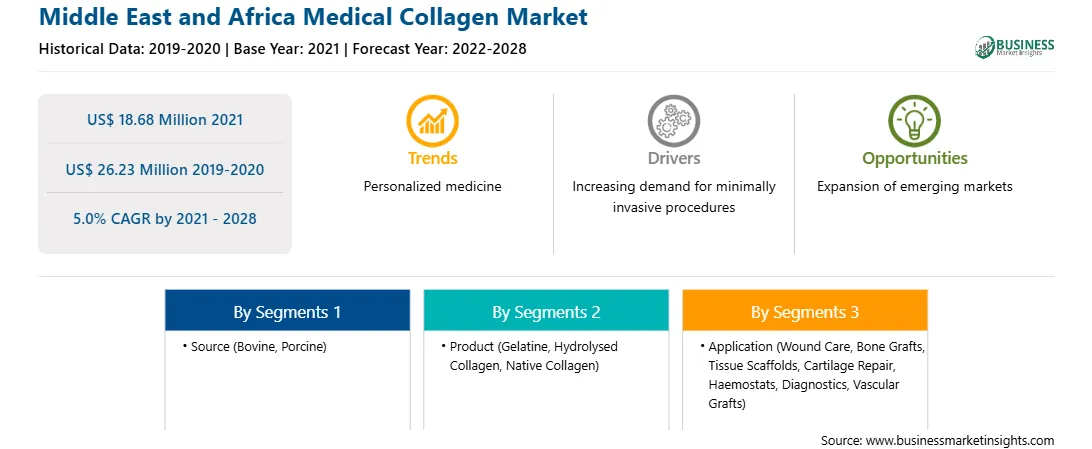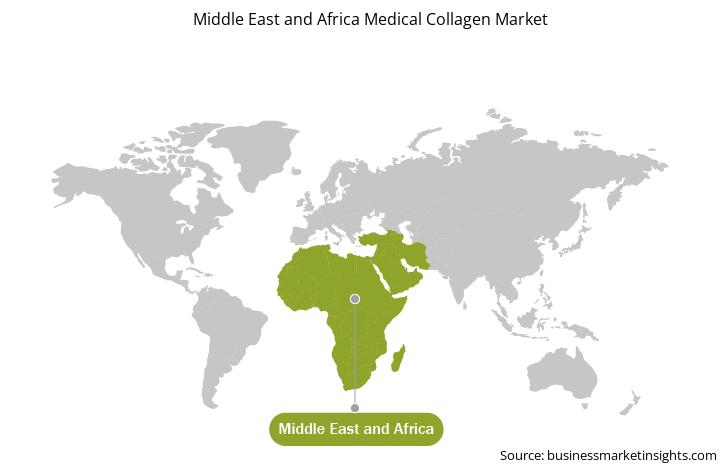Medical collagen is widely used in applications such as wound healing, tissue engineering, reconstructive surgeries, bone grafts, and cosmetic surgeries. It is bio-compatible material with low immunogenicity. Collagen has good hemostatic properties and facilitates wound healing. Collagen is used in cell cultures as it supports cell proliferation in lattice structures and cell binding domain. Hence collagen is widely used as a biomaterial in the medical industry.

Strategic insights for the Middle East and Africa Medical Collagen provides data-driven analysis of the industry landscape, including current trends, key players, and regional nuances. These insights offer actionable recommendations, enabling readers to differentiate themselves from competitors by identifying untapped segments or developing unique value propositions. Leveraging data analytics, these insights help industry players anticipate the market shifts, whether investors, manufacturers, or other stakeholders. A future-oriented perspective is essential, helping stakeholders anticipate market shifts and position themselves for long-term success in this dynamic region. Ultimately, effective strategic insights empower readers to make informed decisions that drive profitability and achieve their business objectives within the market.

| Report Attribute | Details |
|---|---|
| Market size in 2021 | US$ 18.68 Million |
| Market Size by 2028 | US$ 26.23 Million |
| Global CAGR (2021 - 2028) | 5.0% |
| Historical Data | 2019-2020 |
| Forecast period | 2022-2028 |
| Segments Covered |
By Source
|
| Regions and Countries Covered | Middle East and Africa
|
| Market leaders and key company profiles |
The geographic scope of the Middle East and Africa Medical Collagen refers to the specific areas in which a business operates and competes. Understanding local distinctions, such as diverse consumer preferences (e.g., demand for specific plug types or battery backup durations), varying economic conditions, and regulatory environments, is crucial for tailoring strategies to specific markets. Businesses can expand their reach by identifying underserved areas or adapting their offerings to meet local demands. A clear market focus allows for more effective resource allocation, targeted marketing campaigns, and better positioning against local competitors, ultimately driving growth in those targeted areas.

The Middle East and Africa medical collagen market is expected to reach US$ 26.23 million in 2028 from US$ 18.68 million in 2021; it is estimated to register a CAGR of 5.0% from 2021 to 2028. The growth of the Middle East and Africa medical collagen market is attributable to growing applications of collagen in the medical industry, and rising FDA approvals and product launches. However, medical collagen product recalls are hindering the growth of the market.
As collagen is weakly antigenic and biodegradable, it has excellent biocompatibility. Thus, making it a primary resource in medical applications. Collagen is one of the key constituents in cosmetic formulations, as it has moisturizing, regenerating, and film-forming properties. Moreover, collagen fillers are widely used in aesthetic medicines. The subcutaneous injection of soluble collagen enhances the quality and density of the skin, thereby repairing dermatological defects. Collagen-based biomaterials have a wide range of applications in vivo and in vitro. Collagen has been widely used to develop synthetic bone graft substitutes for spine, extremities, and dental requirements. Furthermore, collagen scaffolds are developed to mimic and regenerate native tissues and are being rapidly adopted for cartilage repair. Collagen is naturally involved in the wound-healing process, and the use of collagen-based wound dressing offers several advantages for acute and chronic wound closure. Additionally, collagen dressings can control the moisture of the wound either by absorbing or providing moisture. Thus, collagen is widely used in dressings, particles, and flowable scaffolds to treat acute and chronic wounds. This wide range of applications of collagen in the medical industry is driving the growth of the market. Various players operating in the medical collagen market are developing and launching new products to expand their geographic reach and capacity to cater to a large customer base. Thus, constant advancements in products and approvals from regulatory bodies are factors further driving the growth of the medical collagen market.
Middle East has been witnessing a growing number of COVID-19 cases since its outbreak. The lockdown imposed in the wake of COVID-19 pandemic has affected the supply chain and production of various companies in the Middle East and Africa. As per the pharmacists in Riyadh, there is increased demand for nutritional supplements in Saudi Arabia since the outbreak of COVID-19. The Health Ministry of Middle East is coordinating with pharmacies to limit the quantity of nutritional supplements per customer to prevent the shortage of such items. This is likely to affect the growth of the Middle East and Africa medical collagen market.
The Middle East and Africa medical collagen market, by source, is segmented into bovine, porcine, and others. The bovine segment held the largest share of the market in 2020 and is expected to register the highest CAGR during the forecast period.
The Middle East and Africa medical collagen market, by product, is segmented into gelatine, hydrolysed collagen, native collagen, and others. The gelatine segment held the largest share of the market in 2020 and is expected to register the highest CAGR during the forecast period.
Based on application, the Middle East and Africa medical collagen market has been segmented into haemostats, vascular grafts, tissue scaffolds, cartilage repair, wound care, bone grafts, diagnostics, and others. The wound care segment held the largest share of the market in 2020. However, the bone grafts segment is estimated to register the highest CAGR during the forecast period.
A few of the primary and secondary sources associated with this report on the Middle East and Africa medical collagen market are the Dubai Health Authority (DHA), International Federation of Diabetes (IDF) and Centers for Disease Control and Prevention (CDC).
The Middle East and Africa Medical Collagen Market is valued at US$ 18.68 Million in 2021, it is projected to reach US$ 26.23 Million by 2028.
As per our report Middle East and Africa Medical Collagen Market, the market size is valued at US$ 18.68 Million in 2021, projecting it to reach US$ 26.23 Million by 2028. This translates to a CAGR of approximately 5.0% during the forecast period.
The Middle East and Africa Medical Collagen Market report typically cover these key segments-
The historic period, base year, and forecast period can vary slightly depending on the specific market research report. However, for the Middle East and Africa Medical Collagen Market report:
The Middle East and Africa Medical Collagen Market is populated by several key players, each contributing to its growth and innovation. Some of the major players include:
The Middle East and Africa Medical Collagen Market report is valuable for diverse stakeholders, including:
Essentially, anyone involved in or considering involvement in the Middle East and Africa Medical Collagen Market value chain can benefit from the information contained in a comprehensive market report.